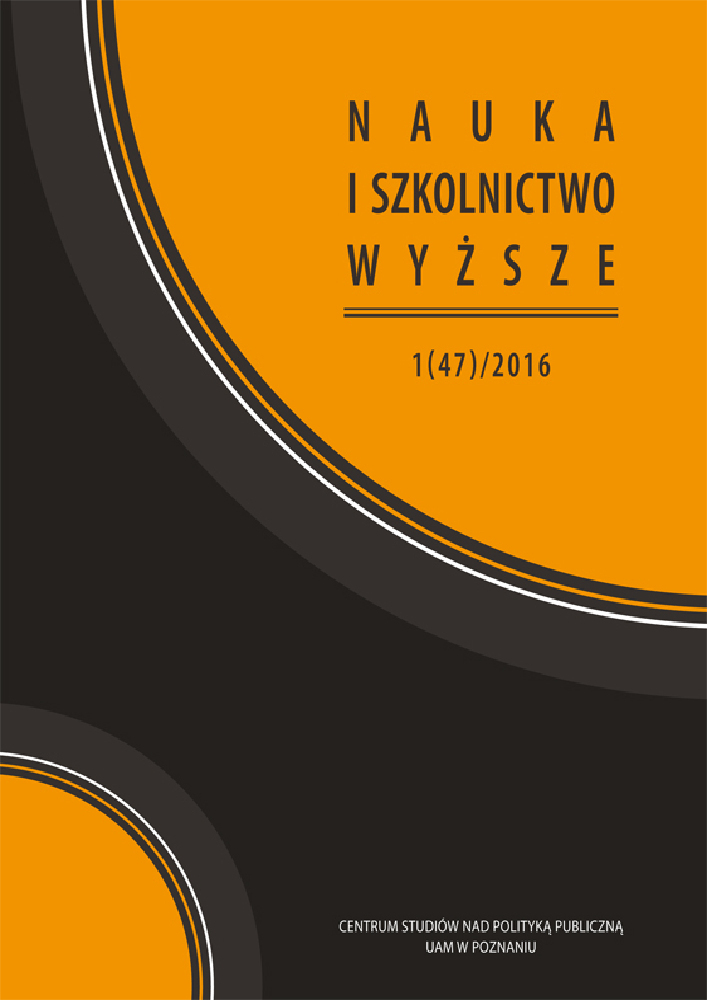Abstract
The paper presents results of qualitative research on PhD holders working at Polish universities, regarding their international mobility. The respondents’ opinions on mobility, their experiences of it (e.g. experiences of study visits), as well as obstacles, which prevented mobility were taken into consideration and analysed. Special attention was given to family issues (related to partners and children), language competences and working conditions. Declarations regarding mobility were compared to data on the respondents’ sources of income. For some of them the partner’s income was a primary means of livelihood. Therefore, we argue that demanding more mobility from the researchers may be counter-productive, since the mobility of the family could put the partner’s income at risk.
References
Ackers, L. (2004). Managing relationships in peripatetic careers: Scientific mobility in the european union. Women’s Studies International Forum. 27(3): 189-201.
Ackers, L., Balch, A., Scott, S., Currie, S., Millard, D. (2009). The Gender Dimension of Geographic Labour Mobility in the European Union. http://www.europarl.europa.eu/committees/fr/studiesdownload.html?languageDocument=EN&file=28228 [30.09.2016].
Altbach, P.G., Knight, J. (2007). The Internationalization of Higher Education: Motivations and Realities. Journal o f Studies in International Education. 11 (3-4): 290-305.
Arai, K. (2010). Japanese science in a global world. Science. 328(5983): 1207.
Baruffaldi, S.H., Landoni, P. (2012). Return mobility and scientific productivity of researchers working abroad: The role of home country linkages. Research Policy. 41 (9): 1655-1665.
Batorski, D., Bojanowski, M., Czerniawska, D. (2009). Diagnoza mobilności instytucjonalnej i geograficznej osób ze stopniem doktora w Polsce. http://www.nauka.gov.pl/analizy-raporty-statystyki/diagnoza-mobilnosci-instytucjonalnej-i-geograficznej-osobze-stopniem-doktora-w-polsce-w-roku-2009,archiwum,1,akcja,pdf.html [30.09.2016].
Bauder, H. (2015). The international mobility of academics: A labour market perspective. International Migration. 53(1): 83-96.
Boring, P., Flanagan, K., Gagliardi, D., Kaloudis, A., Karakasidou, A. (2015). International mobility: Findings from a survey of researchers in the EU. Science and Public Policy. 1-16.
Canibano, C., Bozeman, B. (2009). Curriculum vitae method in science policy and research evaluation: The state-of-the-art. Research Evaluation. 18(2): 86-94.
Corley, E.A., Sabharwal, M. (2007). Foreign-born academic scientists and engineers: Producing more and getting less than their U.S.-born peers? Research in Higher Education. 48(8): 909-940.
Czaika, M., Toma, S. (2015). Working Papers Path-dependency in International Academic Careers (No. 108). Oxford: International Migration Institute.
Dillon, N. (2001). Tackling the postdoc brain drain. European Molecular Biology Organization Reports. 2(9): 746-747. http://doi.org/10.1093/embo-reports/kve190 [30.09.2016].
Fahey, J., Kenway, J. (2010a). International academic mobility: problematic and possible paradigms. Discourse: Studies in the Cultural Politics o f Education. 31(5): 563-575.
Fahey, J., Kenway, J. (2010b). Moving ideas and mobile researchers: Australia in the global context. Australian Educational Researcher. 37(4): 103-114.
IDEA Consult (2010). Study on mobility patterns and career paths of EU researchers. FINAL Technical Report 3: Extra-EU mobility pilot study. http://cdigital.uv.mx/bitstream/123456789/33768/1/studyonmobility.pdf [30.09.2016].
Jarausch, K.H. (2005). Challenges of Internationalization: Careers in Humanities and Social Sciences. Arbeits- und Diskussionspapier. 3: 32-34.
Jons, H. (2009). „Brain circulation” and transnational knowledge networks: Studying longterm effects of academic mobility to Germany, 1954-2000. Global Networks. 9 (3): 315338.
Kidd, J.M., Green, F. (2006). The careers of research scientists: Predictors of three dimensions of career commitment and intention to leave science. Personnel Review. 35(3): 229-251.
Kim, S. (2010). From Brain Drain to Brain Competition: Changing Opportunities and the Career Patterns of US-Trained Korean Academics. W: C.T. Clotfelter (red.). American Universities in a Global Market (335-369). Chicago: University of Chicago Press.
Kim, T. (2010). Transnational academic mobility, knowledge, and identity capital. Discourse: Studies in the Cultural Politics of Education. 31(5): 577-591.
Kowzan, P., Zielińska, M., Kleina-Gwizdała, A., Prusinowska, M. (2016). „Nie zostaje mi czasu na pracę naukową” Warunki pracy osób ze stopniem doktora, zatrudnionych na polskich uczelniach. Gdańsk - Bydgoszcz - Warszawa: Nowe Otwarcie Uniwersytetu. https://noweotwarcie.files.wordpress.com/2016/04/nie-zostaje-mi-czasu-napracc499-naukowc485-raport-nou3.pdf [30.09.2016].
Kwiek, M., Antonowicz, D. (2015). The Changing Paths in Academic Careers in European Universities: Minor Steps and Major Milestones. W: T. Fumasoli, G. Goastellec, B.M. Kehm (red.). Academic Work and Careers in Europe: Trends, Challenges, Perspectives (41-68). Cham - Heidelberg - New York - Dordrecht - London: Springer.
Lehn, T. (2016). Academic Mobility: The Transnational Flow of U.S. Academic Staff to Higher Education Institutions in the Countries of the Gulf Cooperation Council. Minneapolis: University of Minnesota.
McNair, S. (2009). Migration, Communities and Lifelong Learning. IFLL Thematic Paper 3. Leicester: National Institute of Adult Continuing Education.
Morano-Foadi, S. (2005). Scientific mobility, career progression, and excellence in the European Research Area. International Migration. 43(5): 133-162.
Musselin, C. (2004). Towards a European Academic Labour Market? Some Lessons Drawn from Empirical Studies on Academic Mobility Towards a European academic labour market? Some lessons drawn from empirical studies on academic mobility. Higher Education. 48(1): 55-78.
Paradeise, C., Thoenig, J.-C. (2013). Academic Institutions in Search of Quality: local orders and global standards. Organization Studies. 34(2): 189-218.
Stephan, P., Franzoni, C., Scellato, G. (2016). Global competition for scientific talent: Evidence from location decisions of PhDs and postdocs in 16 countries. Industrial and Corporate Change. 25(3): 457-485.
VohHdalovå, M. (2014). Academic mobility in the context of linked lives. Human Affairs. 24(1): 89-102.
Wagner, I. (2011). Becoming Transnational Professional. Kariery i mobilność polskich elit naukowych. Warszawa: Scholar.
Zielińska, M. (2016). Autoreferat rozprawy doktorskiej pt. „Miejsce, mobilność i edukacja. Dorośli Polacy w Reykjaviku”. https://www.academia.edu/24197664/Autoreferat_rozprawy_doktorskiej_pt._Miejsce_mobilno%C5%9B%C4%87_i_edukacja._Doro%C5%9Bli_Polacy_w_Reykjaviku [30.09.2016].
Zielińska, M., Kowzan, P., Ragnarsdóttir, H. (2014). Polish complementary schools in Iceland and England. Intercultural Education. 25 (5): 405-417.
